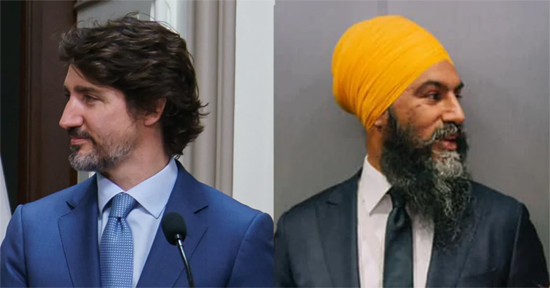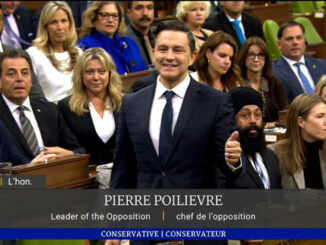
NDP is Focused on by-elections for now
OTTAWA (TIP): Canadian Prime Minister Justin Trudeau suffered an unexpected blow on Wednesday, September 4, when the small party helping keep his minority Liberal government in power withdrew its automatic support, forcing him to attempt new alliances to govern, says a Reuters report.
Promising to continue governing and pushing through social programs, Trudeau dismissed talk of early elections after the left-leaning New Democratic Party’s leader Jagmeet Singh said he was “ripping up” a deal struck between the two men in 2022.
But the move leaves Trudeau reliant on support from other opposition lawmakers to survive confidence votes in the lower chamber of parliament at a time when polls show he will lose badly if an election were held now. An election must be held by the end of October 2025 under Canadian law.
“An election will come in the coming year, hopefully not until next fall, because in the meantime, we’re going to deliver for Canadians,” Trudeau told reporters at a school where he had arrived to talk about expanding lunch programs.
“I really hope the NDP stays focused on how we can deliver for Canadians, as we have over the past years, rather than focusing on politics.”
Trudeau, 52, first took office in November 2015 but has over the last two years struggled to fend off attacks from the opposition center-right Conservatives, who blame him for high inflation and a housing crisis.
With the NDP’s support, his government has pushed through social programs designed to address the cost of living.
But the NDP’s Singh had expressed growing frustration with Trudeau in recent months, especially over what he said was the Liberals’ failure to deal with high prices at grocery stores.
“Justin Trudeau has proven again and again he will always cave to corporate greed,” Singh said in a video posted on social media where he also declared that he would run for prime minister in the next election. “Liberals have led people down – they don’t deserve another chance.”
Establishing independence
Polls indicate the same voter fatigue plaguing Trudeau has also spread to the NDP, which despite successfully pushing the Liberals to introduce measures such as a national dental program is languishing far behind in third place. Under the 2022 deal, the NDP agreed to keep Trudeau in power until mid-2025 in return for more social spending.
Conservative leader Pierre Poilievre reiterated his call for an early election to break up what he called a Liberal-NDP coalition driving up prices for Canadians.
The House of Commons resumes work on Sept. 16, after which the Conservatives will have the ability to propose a vote of confidence. Trudeau’s Liberals could still survive if the NDP abstained on such a vote.
A statement from the NDP said the party would decide on an issue-by-issue basis whether to support the Liberals on confidence votes, suggesting it may continue to prop up Trudeau if his fate hung in the balance.
A key moment for Trudeau’s government will be its budget update later this year, which, if voted down by legislators would trigger a new election.
A senior journalist Prabhjot Singh, in a report filed late Thursday night, says Immediate Battle is for by- and not Federal elections. While Elmwood-Transcona and LaSalle-Emard-Verdun to vote on September 16, two more- Cloverdale-Langley City and Halifax – wait for the by-election.
In less than 24 hours of the death of the NDP-Liberal deal, politics in Canada have taken a turn, putting the nation back on two prestigious, by-elections scheduled to coincide with the next sitting of the House of Commons on September 16.
Interestingly, Jagmeet Singh of NDP, who ripped the NDP-Liberal deal yesterday, looks more focused on two by-elections scheduled for September 16 than forcing the federal elections for which the leader of Opposition and Conservative party chief, Pierre Poilievre, has been instigating him to vote out minority Liberal government.
In a message to his party workers and volunteers on Thursday, Jagmeet Singh, said, “I am pretty sure you know this by now, but I am deeply committed to defeating Conservatives in the next election.
“But it doesn’t happen all at once. It happens one riding, one volunteer shift, and one phone call at a time.
“The by-election in Elmwood-Transcona is a crucial step on our path to defeating Conservatives. Will you commit to walking that path with me?” asks Jagmeet Singh.
The Elmwood-Transcona was held by his party’s Daniel Blaikie who quit the House of Commons riding on March 31 this year. The NDP has now put up Leila Dance in a field of six contestants. Others in the fray are Sarah Couture (People’s Party of Canada), Nicolas Gaddert (Green Party), Ian McIntyre (Liberal), Colin Reynolds (Conservative) and Zbig Strycharz (Canadian Future Party).
Another riding going to poll on September 16 is LaSalle-Emard-Verdun in Quebec. The incumbent David Lametti resigned on February 1 this year to force this by-election. As of today, there are 90 candidates, 80 of them Independent or non-affiliated in the run besides nominees of all major parties like Liberals, Green, Conservatives, Canadian Future Party, Christian Heritage Party of Canada, NDP, Bloc Quebecois, People’s Party of Canada and Marxist-Leninist Party of Canada.
The situation is intriguing. On one hand, the main opposition party, Conservatives, is working overtime to force an early Federal election, while on the other, no party is taking any chances with the September 16 by-elections, winners of which may hardly get any fruitful time to sit in the lower House of Canadian Parliament.
By-elections are primarily a litmus test for the popularity of a government. In the eight by-elections during the current term of the House of Commons, the Liberals could retain only three of four seats it held earlier while the Conservatives extended their hold from four to five seats.
Two more by-elections – Cloverdale-Langley City and Halifax – are also in the offing. Experts, on the other hand, hold that though the Liberal-NDP deal is dead, it does not necessarily mean a fall election. Yesterday’s development puts PM Trudeau in a tight spot. Still, everything is not over for him as he has options.
No doubt the Liberal government is now on shakier ground. It cannot now rely with certainty on the NDP to prop it up on confidence votes in a Parliament where it has been reduced to a minority of the seats.
The rapidly changing political environment does not mean the government would soon collapse on a confidence vote as the Liberals could still convince NDP or Bloc Quebecois MPs for support on issues that PM Trudeau feels are “important for Canadians.”
Focus on by-elections is yet another indication that NDP is not as keen as Conservatives are to force a no-confidence motion at the earliest possible opportunity.
The liberals could still engage in some horse-trading with the NDP or one of the other opposition parties to cobble together enough votes to get its legislation through Parliament and stave off an election. An opposition party could support the government’s agenda piecemeal, and not through a formal agreement like the one that was ripped up today.
Whatever the thinking of major political parties, the Liberal government’s future is on a knife’s edge — it could be brought down at any time through a non-confidence vote when Parliament returns later this month. video saying he ‘ripped up’ NDP deal with Liberals
Under Canada’s Westminster system of parliamentary democracy, the Prime Minister and his government must enjoy the confidence of a majority of MPs to remain in office.
This can be tested through a confidence vote. The government can designate any vote as a confidence vote, while any bill related to the government’s budget is usually regarded as a confidence vote. An individual MP can also table a motion of non-confidence at any time to try and topple the government.
If the Liberal government wants to win those votes, Trudeau and his cabinet will have to convince at least one of the major opposition parties to vote their way.
Conservative Leader Pierre Poilievre has signaled he will not back the government — riding high in the polls, he wants an election sooner rather than later. He tabled a non-confidence motion in the spring but it was defeated.
The NDP may not go all out with the Conservatives in toppling the minority government as it still wants to get more out of the Liberal government before the next election.
That means the NDP could offer limited support on confidence votes in this sitting of Parliament in exchange for some more policy commitments. It already has pushed the government to enlarge the social safety net through new pharma care and dental programs. It wants more.
(With inputs from Prabhjot Singh)





Be the first to comment